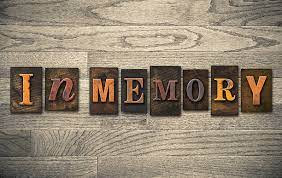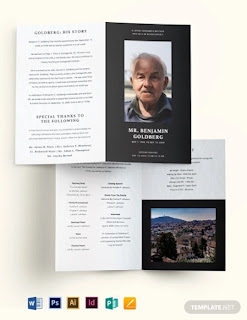I had never written a eulogy, so I turned first to Google, which provided a few general tips. Then I asked my friends for help. They were a gold mine! One thing I discovered was that a great many people have had to write a eulogy for a friend or family member. The tips they gave me were very helpful and saved me a lot of frustration and confusion. After finishing the eulogy for my Dad, it became obvious that many other people would appreciate a little guidance in the process, too.
How to Write a Eulogy
Ask various family members for stories to include. Everyone has different memories of the person who passed away, so it will be helpful to collect a variety of stories to share. Include the memories of some of the younger members of the family, especially if they had a special connection to a grandparent or a favorite aunt or uncle. Their parents may be able to help with that. Do not forget to jot down your own memories, too. Remember that you represent the family, so you want to share as many of their memories as possible, as well as your own.
Organize the memories into some type of pattern. You may want to write it in chronological order, or it could be separated into categories, such as the memories of the children, then grandchildren, then various friends or co-workers. You may be able to get some ideas on what to say about the person by reading "The Book of Eulogies." (Ad) It contains famous eulogies which might inspire you.
Avoid Negative Statements. Over the years, I have attended a few funerals where some pretty surprising statements were made. At one, the daughter of the woman who died said, "There's not much I can say about my mother, except she did keep us fed and clothed when we were children." At another funeral, the wife of the deceased man said, "My husband was not that easy to live with." Although I certainly remember those funerals, perhaps it would have been better for the speakers to say those things privately, not at not at a public ceremony!
Introduce yourself. Start the eulogy with a positive comment about the deceased. Then, introduce yourself and thank the people who came to the funeral. Here is how I began the eulogy for my father:"If a man's wealth can be measured by the number of people who loved him and enjoyed being around him, then our father was a very wealthy man. I am his daughter, Deborah, and my sister Pamela and I really appreciate all of you who came here today to honor the memory of our father."
You could also start with a quote or a quick memory about your father, and then follow with your introduction. Some people who knew the deceased may be strangers to the person giving the eulogy, and would like to know how you are connected.
Keep it positive and somewhat light-hearted. Fill the remainder of the eulogy with as many positive, happy stories about the deceased as you have time to share. Make sure you include a variety of memories from everyone who shared a story with you, so no one feels as if they were left out. Below are a few clips from the eulogy I wrote for my father:
"My parents loved to dance and enjoyed getting dressed up to go to a party. I even gave Mom a pink poodle skirt that belonged to my daughters for her to wear to a 50's party."
"Dad helped his grandchildren search for 'gold' on the beach, but only told them later that he had given them Fool's Gold."
"On another occasion, he removed his dentures that held his two front teeth and told his grandchildren that a fish had grabbed them. Later, when he put his dentures back in, he told his grandchildren that he had caught the fish and got his teeth back."
"Dad was a great storyteller. He loved to tell us about the time Mom was learning to drive, and drove a friend's car right through the front window of a bakery!"
I'm sure that everyone in your family will have some funny stories or quotes about each deceased member of your family, too!
If the deceased was in the military, had a career which was important to them, or they were active in a religious, charitable, or community organization, mention these connections. In my father's eulogy, I spoke about his years of service in the military, as well as the decades he spent working for the Veteran's Administration. I also shared how proud he was of his contributions to the military and the VA, as well as some of the humorous stories he had told us about his experiences.
End with a fond memory of the deceased. Because my parents loved to dance, I ended by saying, "I will forever think of them as dancing together in the afterlife." However, everyone should end their eulogy with a statement that is in keeping with their religious beliefs, as well as something important which describes the person who has passed away.
If you are still struggling with how to arrange the eulogy, or what to write, you may find it helpful to get the "Eulogy Workbook: A Step-by-Step Guide to Help You Write an Unforgettable Eulogy." (Ad)
Once you have written your first draft, share it with the family. Have several family members read the eulogy to make sure you have captured the stories and memories in the way they intended. Do not be surprised if they suggest changes to help the stories fit their memories.
Ask for editing help. No matter how well you think you write, it can be very helpful to have someone else check your grammar, punctuation, and the way your stories are written. This person should not know the deceased, so they can focus on how you wrote the eulogy, not on what you wrote. It is easy to miss mistakes in our own writing, so having a friend edit it can be very helpful.
Make a printed copy of the eulogy. You can print it on one sheet of pretty paper, or create a bi-fold brochure, similar to a church bulletin. You might even choose to add a picture of the deceased. Do it yourself on your home computer, or ask a friend to help you.Your finished eulogy may be longer than you have time to share at the funeral or memorial service. Decide whether you are going to be the main speaker at a church service, or if you are giving the eulogy to a minister or another person to read aloud. That will affect how you word the eulogy.
On the other hand, you might use the eulogy as the basis for a brief statement you make at a graveside service. In that case, you can give the full, typed eulogy to the guests, and just share some of the highlights verbally, to cut the length of time people need to stand outside. Everyone can still enjoy reading the full eulogy in their own time. Later, you can also mail copies of the eulogy to family members and close friends who were unable to attend the funeral.
Although this can be a very stressful time for you and the family of the deceased, try to leave them with a feeling of comfort and warmth. They may not remember everything you say that day, but will appreciate having a written copy to read and re-read in the months to come.
 |
| Order at: deborahdiangifts.etsy.com |
You may also wish to purchase an appropriate item of religious jewelry to wear at the funeral or memorial service for your loved one. You can find such items at my Etsy store, including the pendant shown here.
If you wish to give an item of jewelry as a gift, you can also have the message inside the box personalized to fit the situation.
You can find jewelry and gifts for retirees and others at my Etsy Store, DeborahDianGifts:
http://www.etsy.com/shop/DeborahDianGifts
Enjoyed this post? Never miss out on future posts by following us. You will receive one weekly email containing the most current post.
If you are interested in learning more about common issues as we age, financial planning, Social Security, Medicare, where to retire, common medical issues as you age, travel and more, use the tabs or pull down menu at the top of the page to find links to hundreds of additional helpful articles.
Disclosure: This blog may contain affiliate links. If you decide to make a purchase from an Amazon ad, I'll make a small commission at no extra cost to you.
You are reading from the blog: http://www.baby-boomer-retirement.com
Photo credits: Google images and my Etsy Store


